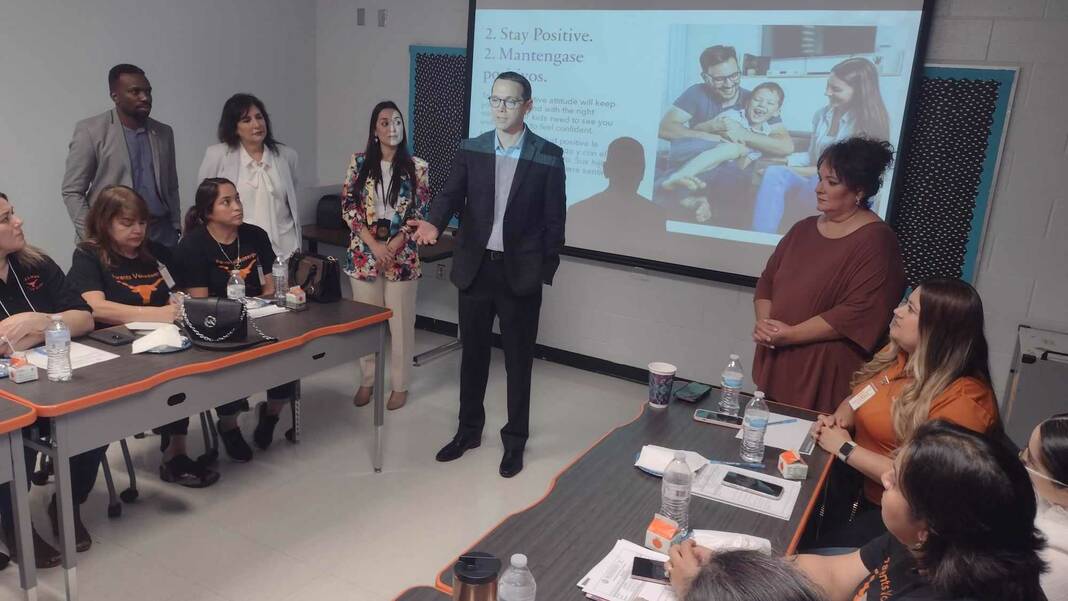|
Only have a minute? Listen instead
Getting your Trinity Audio player ready...
|

Texas Education Commissioner Mike Morath said he chose the Brownsville Independent School District for his first visit of the 2023-2024 school year because BISD is one of the top three preforming public school districts in Texas.
“I wanted to come here to Brownsville and to Stillman (Middle School) because of what we see here in terms of the excellence that the teachers provide and the administration, but of what the kids do. You see it from the moment you walk into the school … a culture of excellence, with high levels of discipline and love. It’s extraordinary,” Morath said during a news conference in the Stillman library that capped a two hour visit to the school on Wednesday.
“The progress that we see academically in the Rio Grande Valley writ large is actually fairly extraordinary. There’s something magical about our educators in this area of Texas. It’s something I like to see to spread best practices around the state,” Morath said.
“Brownsville in particular is one of the top three performing districts in Texas, with the majority of students coming from families with economic challenges, and so it’s compelling,” Morath also said.
The commissioner visited English literature, science, math and social studies classrooms as lessons were being taught, then joined human development consultant Patricia Valenzuela and a group of parent volunteers who were discussing how to have an impact in their children’s education.
One parent asked Morath about the STAAR test, which measures students’ progress from third grade to eighth grade and in high school.
“The tests are designed to tell us whether or not our kids have learned what is expected in math and in reading at that grade. So we as a state-level policy we have a moral belief system that all kids can learn and achieve at high levels. And so in third grade that means they need to have memorized the times tables among many other things in mathematics. And so at the end of the year we do a test to see how much of third grade have you mastered?” Morath said.
He said the tests are not intended to be a judgment of the kids, but rather “a reflection for us as adults as to how we can upgrade our curriculum and improve our support of teachers.”
Morath said test results were delayed this year because the test was undergoing a major redesign but promised results on or about June 17 this coming year.
The parent, though, wanted to know if there was any chance STAAR testing would be discontinued. Morath said the STAAR test is intended as one test on one day at the end of the year.
“We shouldn’t place more pressure on it than it is. It is meant to give us an analysis of where we are at the end of the year so that we can inform planning for next year,” he said.
Superintendent Rene Gutierrez said now more than ever there is a need to assess kids because of learning loss due to the pandemic.
“We need to close the gaps, and we need to make progress,” he said. “This is a time when we really need to evaluate kids because we still haven’t come out of that learning loss, and we still need to evaluate the progress that the kids are making.”
With regard to teacher salaries, Morath disputed a public perception the Legislature did little to increase teacher pay when it had a $31 billion surplus to work with.
“Actually the state invested about $6 billion dollars in new money in public education as a result of the most recent legislative session. That’s not well understood. It is in fact $6 billion dollars in new money and another $4 billion dollars is likely to come in a special session that’s been appropriated but not yet released, so that’s $10 billion dollars of new resource infusion.”
Morath said Texas has been methodically working to increase teacher compensation.
“We as a state have been attempting to increase teacher salaries pretty consistently. I think it’s up between five and 10 grand in the last decade, with investments for both across the board compensation increases, and then targeted compensation increases. In the last four years we have I think four times the number of teachers making six-figure salaries than we did just four years ago,” Morath said.
“There’s 400,000 teachers in Texas so it’s a large investment to be made,” he added.




